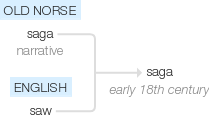Saga
early 18th century: from Old Norse, literally ‘narrative’; related to saw3.
wiktionary
From Old Norse saga(“epic tale, story”), from Proto-Germanic *sagǭ(“saying, story”), from Proto-Indo-European *sekʷe-, *skʷē-(“to tell, talk”). Cognate with Old English sagu(“story, tale, statement”), Old High German saga(“an assertion, narrative, sermon, pronouncement”), Icelandic saga(“story, tale, history”), German Sage(“saga, legend, myth”). More at saw, say. Doublet of saw.
etymonline
saga (n.)
1709, an antiquarians' revival to describe the medieval prose narratives of Iceland and Norway, from Old Norse saga "saga, story," cognate with Old English sagu "a saying" (see saw (n.2)). Properly, a narrative composition of Iceland or Norway in the Middle Ages, or one that has their characteristics. Meaning "long, convoluted story" is from 1857.
